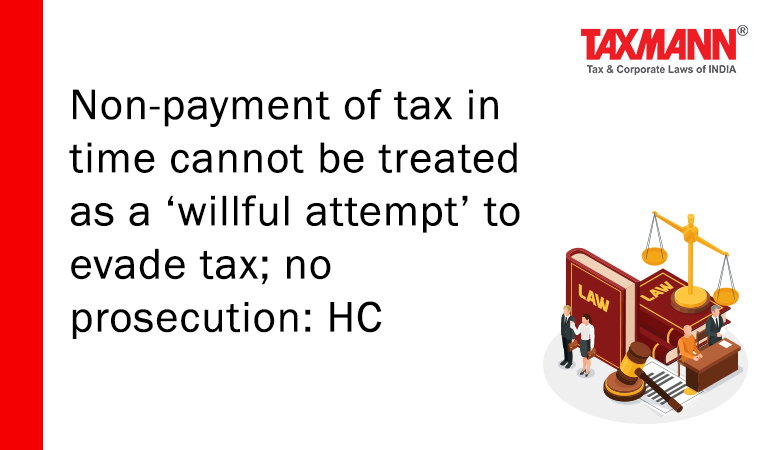Non-payment of tax in time cannot be treated as a ‘willful attempt’ to evade tax; no prosecution: HC
- Blog|News|Income Tax|
- 2 Min Read
- By Taxmann
- |
- Last Updated on 2 May, 2022

Case Details: S.P. Velayutham v. ACIT - [2022] 135 taxmann.com 43 (Madras)
Judiciary and Counsel Details
-
- N Sathish Kumar, J.
- T. Mohan and K. Surendar for the Petitioner.
- L. Muralikrishnan for the Respondent.
Facts of the Case
At the time of filing of Income-tax Return (ITR), the assessee had shown tax payable of Rs.2,22,23,010/- and paid tax of Rs. 10,000,000/- only as self-assessment tax. The Assessing Officer (AO) has launched prosecution proceedings during the assessment as the assessee didn’t pay the required tax.
Against such launch of prosecution, the assessee had filed a petition before the Madras High Court to quash the proceedings.
High Court Held
The Madras High Court held that to prosecute a person; there must be a willful attempt on the part of the assessee to evade payment of any tax, penalty or interest. The explanation to the section 276C makes it very clear that the evasion must be by way of:
(a) Any false entry; or
(b) Statement in the books of account or other documents; or
(c) Omission to make any entry in the books of accounts or other documents; or
(d) Any other circumstances which will have the effect of enabling the assessee to evade tax or penalty or interest chargeable or imposable or the payment thereof.
It is not the case that the assessee had made any false entry in the statements or documents, omitted to make any such entry in the books of account or other documents, or acted in any other manner to avoid tax payment.
It is not the case that the assessee has attempted to alienate the property to defeat the payment etc.
Therefore, when the Return was correctly accepted and the assessment was confirmed, the word employed in the section viz., “wilful attempt”, cannot be imported to mere failure to pay the tax.
Disclaimer: The content/information published on the website is only for general information of the user and shall not be construed as legal advice. While the Taxmann has exercised reasonable efforts to ensure the veracity of information/content published, Taxmann shall be under no liability in any manner whatsoever for incorrect information, if any.

Taxmann Publications has a dedicated in-house Research & Editorial Team. This team consists of a team of Chartered Accountants, Company Secretaries, and Lawyers. This team works under the guidance and supervision of editor-in-chief Mr Rakesh Bhargava.
The Research and Editorial Team is responsible for developing reliable and accurate content for the readers. The team follows the six-sigma approach to achieve the benchmark of zero error in its publications and research platforms. The team ensures that the following publication guidelines are thoroughly followed while developing the content:
- The statutory material is obtained only from the authorized and reliable sources
- All the latest developments in the judicial and legislative fields are covered
- Prepare the analytical write-ups on current, controversial, and important issues to help the readers to understand the concept and its implications
- Every content published by Taxmann is complete, accurate and lucid
- All evidence-based statements are supported with proper reference to Section, Circular No., Notification No. or citations
- The golden rules of grammar, style and consistency are thoroughly followed
- Font and size that’s easy to read and remain consistent across all imprint and digital publications are applied



 CA | CS | CMA
CA | CS | CMA
